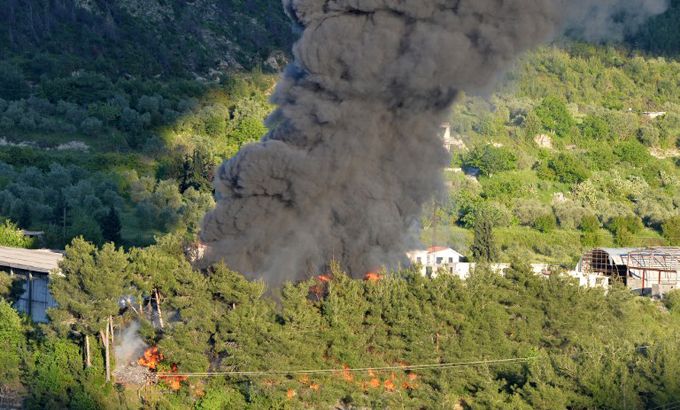Suspicion grows over Syria chemical weapons
UK prime minister backs US spy agencies’ assessment that Damascus likely to have used sarin gas against civilians.

The US has said that Syria has probably used chemical weapons against rebel forces on a “small scale,” but emphasised that intelligence services were still not 100 percent sure.
US spy agencies have investigated reports from Syrian opposition groups that President Bashar al-Assad’s forces have used sarin gas on at least two occasions during the two-year-old conflict.
“Our intelligence community does assess with varying degrees of confidence that the Syrian regime has used chemical weapons on a small scale in Syria,” Caitlin Hayden, a US National Security Council spokesperson, said on Thursday.
Two Syrian officials denied the US accusations, backed by Britain, on Friday, with a senior official saying Damascus did not and would not use chemical weapons even if it had them.
Syrian official Sharif Shehadeh called the US claims `”lies” and likened them to false accusations that Iraq possessed weapons of mass destruction ahead of the U.S. invasion of that country.
Hayden said that the US assessment was based in part on “physiological samples” and pointed to the possible use of sarin, a man-made nerve agent used in two attacks in Japan in the 1990s. It can cause convulsions, respiratory failure and death.
‘Growing evidence’
However, she said the chain of custody of the weapons was “not clear, so we cannot confirm how the exposure occurred and under what conditions”.
Britain’s prime minister David Cameron backed the US assessment on Friday when he said there was growing evidence of chemical weapons use.
President Barack Obama has declared that the deployment of chemical weapons would be a game-changer and has threatened unspecified consequences if it happened. Even so, the Obama administration would likely move carefully, mindful of the lessons of the start of the Iraq war more than a decade ago.
At the time, the US administration used inaccurate US intelligence to justify the invasion of Iraq in pursuit of nuclear, chemical and biological weapons that were not there.
Cameron said on Friday that he agreed with Obama that the use of chemical weapons would represent a “red line” for the international community.
However, he said that the response would likely be political, rather than military.
“What we need to do, and we’re doing some of this already, is shape that opposition, work with them, train them, mentor them, help them so we put the pressure on the regime and so we can bring this to an end,” Cameron said.
Positive test sample
Reports this month said British military scientists had studied a soil sample brought back from an area close to Damascus and found it tested positive for chemical weapons, although the government has not confirmed that.
|
Al Jazeera talks to Ralf Trapp, chemical weapons expert
|
Meanwhile, UN leader Ban Ki-moon renewed a call for Syria to let inspectors into the country.
Syria asked for a UN investigation but has since refused to let a UN team waiting in the region into the country.
Assad’s government only wants its claims that opposition rebels used chemical arms to be investigated. Ban has said the team should also look into opposition claims.
Ban has noted the US claims and “takes seriously the assessment presented,” UN spokesman Martin Nesirky said, commenting on the comments from the US.
“However, the United Nations is not in a position to comment on assessments based on national intelligence information.”